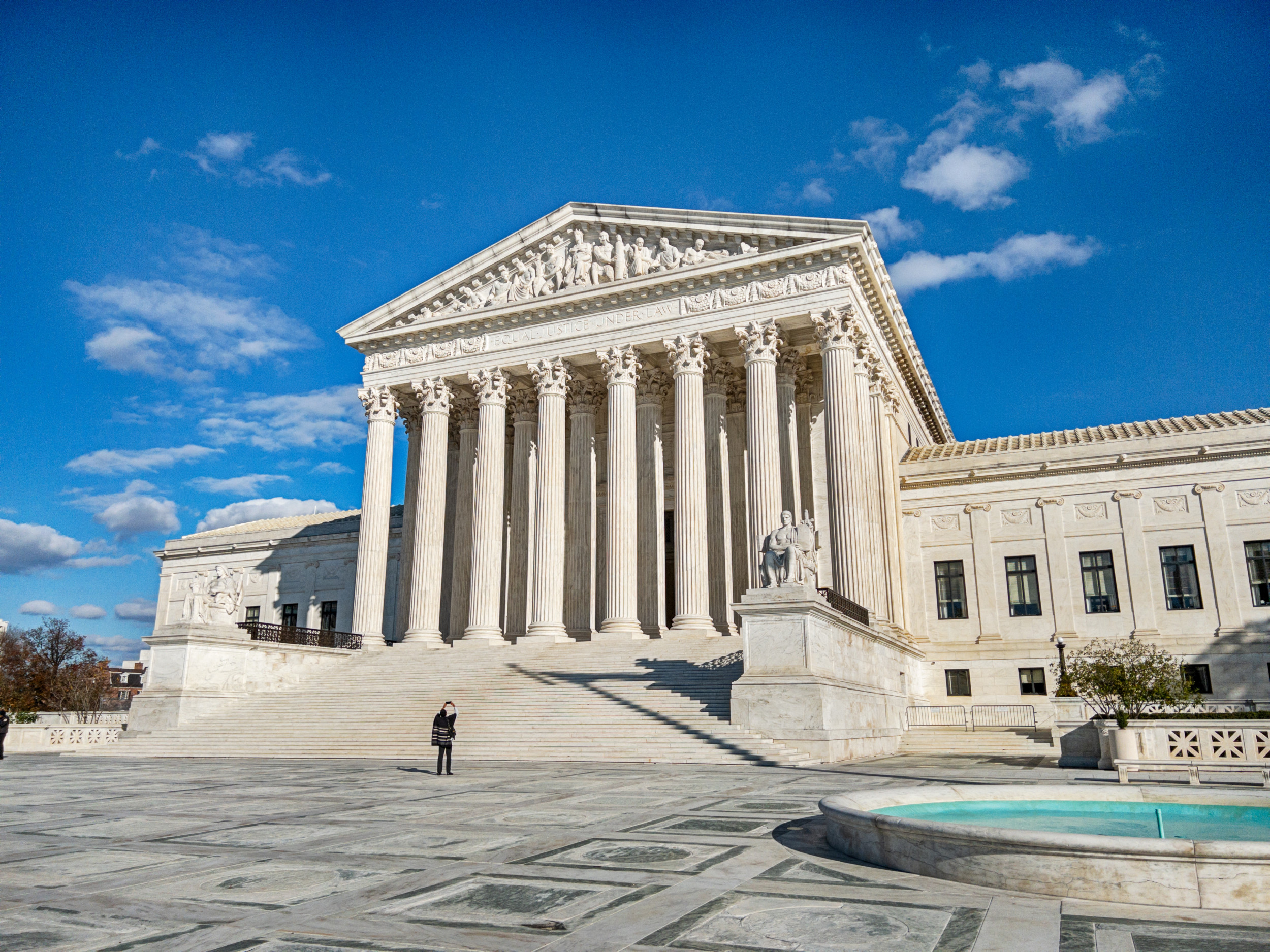North Carolina
Former AG Eric Holder praises Supreme Court decisions on voting districts in Alabama, North Carolina

Former Attorney General Eric Holder on Sunday praised the Supreme Court decisions over voting districts in Alabama and North Carolina.
Holder, who served under former President Obama, told CBS’s Margaret Brennan on “Face the Nation” that the court’s decision over congressional districts in Alabama will have “an impact beyond” its state. Earlier this month, the Supreme Court struck down Alabama’s congressional maps and ruled that it likely violates the Voting Rights Act by diminishing the power of Black voters.
“That decision will have an impact beyond the state of Alabama. If you look at Georgia, Louisiana, Texas, they also have instances where the lines have been drawn in such a way to dilute the voting power of African Americans,” Holder said. “And again, inconsistent with the Voting Rights Act. And so I think that you will also see courts rule consistent with the Supreme Court’s ruling that those lines will have to be redrawn in those states as well.”
Holder also said that the Supreme Court’s ruling last week that rejected a bid to give state legislatures sweeping authority in drawing congressional maps and regulating federal elections gave him more “confidence” that there will be a fair election in 2024.
“It makes me a lot more confident that we’re going to have a fair election come 2024 and that this ridiculous notion of independent state legislature theory will hopefully just go away,” Holder said. “That was a as fringe a theory as has ever been heard by the United States Supreme Court. The only disappointment I had in that decision is that it was not a nine to zero decision.”
“The notion of the independent state legislature theory was that courts that — that the legislators had the final say, without any involvement of court review,” he added. “And that’s inconsistent with our notion of checks and balances. It will mean that we will have the ability to go before state courts to look at what legislators and sometimes gerrymandered legislatures are doing with regard to redistricting.”
In its ruling, the court declined to endorse the so-called “independent state legislature” theory advanced by North Carolina Republicans and instead ruled to preserve state courts ability to hear partisan gerrymandering lawsuits in congressional redistricting as well as review other federal election rules set by state legislatures.
Copyright 2023 Nexstar Media Inc. All rights reserved. This material may not be published, broadcast, rewritten, or redistributed.

North Carolina
Former North Carolina, Arkansas QB Jacolby Criswell signs with surprising school

North Carolina transfer quarterback Jacolby Criswell has signed to play for East Tennessee State in 2025, On3’s Pete Nakos confirmed. He spent four total seasons in Chapel Hill and will have one year of eligibility remaining.
Criswell played the first three seasons of his college career with the Tar Heels before transferring to Arkansas ahead of 2023. He played one year in Fayetteville before deciding to come back to North Carolina ahead of this season.
Criswell didn’t begin as the starter this past season but took over after Max Johnson went down with injury. He finished the year with 2,459 yards and 15 touchdowns to six interceptions.
This story will be updated.
North Carolina
North Carolina among 18 states suing to stop Trump’s order blocking birthright citizenship

WASHINGTON, D.C. (WITN) – Attorneys general from 18 states sued Tuesday to block President Donald Trump’s move to end a decades-old immigration policy known as birthright citizenship guaranteeing that U.S.-born children are citizens regardless of their parents’ status.
Trump’s roughly 700-word executive order, issued late Monday, amounts to a fulfillment of something he’s talked about during the presidential campaign. But whether it succeeds is far from certain amid what is likely to be a lengthy legal battle over the president’s immigration policies.
North Carolina is one of the 18 states challenging the executive order. Attorney General Jeff Jackson is asking the court to invalidate the executive order and stop it from being implemented.
“This executive order is a straightforward violation of the Fourteenth Amendment, which guarantees citizenship to all people born on U.S. soil. For over a century, this principle has been upheld by the Supreme Court and remains a bedrock of our constitutional framework,” said Jackson.
Attorney General Jackson says the Constitution leaves no room for reinterpreting this matter.
“As Attorney General, my role is straightforward as well: to defend the Constitution. That’s why I’ve joined this lawsuit, to uphold the rule of law and preserve the rights that have defined our nation for generations,” said Jackson.
Here’s a closer look at birthright citizenship, Trump’s executive order and reaction to it:
What is birthright citizenship?
Birthright citizenship means anyone born in the U.S. is a citizen, regardless of their parents’ immigration status. People, for instance, in the United States on a tourist or other visa or in the country illegally can become the parents of a citizen if their child is born here.
It’s been in place for decades and enshrined in the 14th Amendment to the Constitution, supporters say. But Trump and allies dispute the reading of the amendment and say there need to be tougher standards on becoming a citizen.
What does Trump’s order say?
The order questions that the 14th Amendment extends citizenship automatically to anyone born in the United States.
The 14th Amendment was born in the aftermath of the Civil War and ratified in 1868. It says: “All persons born or naturalized in the United States and subject to the jurisdiction thereof, are citizens of the United States and of the State wherein they reside.”
Trump’s order excludes the following people from automatic citizenship: those whose mothers were not legally in the United States and whose fathers were not U.S. citizens or lawful permanent residents; people whose mothers were in the country legally but on a temporary basis and whose fathers were not citizens or legal permanent residents.
It goes on to bar federal agencies from recognizing the citizenship of people in those categories. It takes effect 30 days from Tuesday, on Feb. 19.
What is the history of the issue?
The 14th Amendment did not always guarantee birthright citizenship to all U.S.-born people. Congress did not authorize citizenship for all Native Americans born in the United States, for instance, until 1924.
In 1898 an important birthright citizenship case unfolded in the U.S. Supreme Court. The court held that Wong Kim Ark, who was born in San Francisco to Chinese immigrants, was a U.S. citizen because he was born in the country. After a trip abroad, he had faced denied reentry by the federal government on the grounds that he wasn’t a citizen under the Chinese Exclusion Act.
But some advocates of immigration restrictions have argued that while the case clearly applied to children born to parents who are both legal immigrants, it’s less clear whether it applies to children born to parents without legal status.
What has the reaction to Trump’s order been?
Eighteen states, plus the District of Columbia and San Francisco sued in federal court to block Trump’s order.
New Jersey Democratic Attorney General Matt Platkin said Tuesday that presidents might have broad authority but they are not kings.
“The president cannot, with a stroke of a pen, write the 14th Amendment out of existence, period,” he said.
Connecticut Attorney General William Tong, a U.S. citizen by birthright and the nation’s first Chinese American elected attorney general, said the lawsuit was personal for him.
“The 14th Amendment says what it means, and it means what it says —- if you are born on American soil, you are an American. Period. Full stop,” he said. “There is no legitimate legal debate on this question. But the fact that Trump is dead wrong will not prevent him from inflicting serious harm right now on American families like my own.”
Not long after Trump signed the order, immigrant rights groups filed suit to stop it.
Chapters of the American Civil Liberties Union in New Hampshire, Maine and Massachusetts along with other immigrant rights advocates filed a suit in New Hampshire federal court.
The suit asks the court to find the order to be unconstitutional. It highlights the case of a woman identified as “Carmen,” who is pregnant but is not a citizen. The lawsuit says she has lived in the United States for more than 15 years and has a pending visa application that could lead to permanent status. She has no other immigration status, and the father of her expected child has no immigration status either, the suit says.
“Stripping children of the ‘priceless treasure’ of citizenship is a grave injury,” the suit said. “It denies them the full membership in U.S. society to which they are entitled.”
In addition to North Carolina, New Jersey and the two cities, California, Massachusetts, Colorado, Connecticut, Delaware, Hawaii, Maine, Maryland, Michigan, Minnesota, Nevada, New Mexico, New York, Rhode Island, Vermont, and Wisconsin joined the lawsuit to stop the order.
Copyright 2025 WITN. All rights reserved.
North Carolina
Tropical Storm Helene destroyed nearly 1,000 homes in NC, FEMA maps show

McDowell County resident shares his story of loss from Helene floods in western North Carolina
Chris Loftis shares his story of the Tropical Storm Helene floods along Highway 80 in McDowell County.
Tropical Storm Helene destroyed nearly 1,000 homes when it tore through Western North Carolina Sept. 27, maps from the Federal Emergency Management Agency show.
The maps, which show verified damage to homes as of Jan. 7, were presented to the Buncombe County Board of Commissioners at its Jan. 16 budget retreat.
In Buncombe County, Helene destroyed 340 homes, according to the maps. More than 170 were owner-occupied, while the remaining were rental properties.
The maps also show how many homes across the state sustained major damage and how many require repairs so residents can move back in.
According to the maps, 2,360 homes suffered major damage. Nearly one-third were rentals. Additionally, nearly 30,000 homes require habitability repairs, according to the maps. More than 6,000 of those homes were occupied by renters.
The number of damaged homes verified by FEMA is significantly lower than initial estimates from the state. According to a Dec. 13 damage needs assessment compiled by the N.C. Office of State Budget and Management, more than 73,000 homes were projected to be damaged, the majority of which were expected to be single-family and manufactured homes, and duplexes. In total, the state is estimating nearly $13 billion in residential damage alone.
The Citizen Times requested updated damage maps from FEMA on Jan. 17.
How did homes in Buncombe, Henderson, McDowell, Madison and Yancey counties fare?
Destroyed homes:
Buncombe: 340
Henderson: 89
McDowell: 92
Yancey: 100
Madison:11+
Major damage:
Buncombe: 640
Henderson: 354
McDowell: 128
Yancey: 166
Madison: 56
Homes requiring habitability repairs:
Buncombe: 8,920
Henderson: 3,988
McDowell: 1,442
Yancey: 1,767
Madison: 302
Jacob Biba is the county watchdog reporter at the Asheville Citizen Times, part of the USA TODAY Network. Email him at jbiba@citizentimes.com.
-
/cdn.vox-cdn.com/uploads/chorus_asset/file/25826211/lorealcellbioprint.jpg)
/cdn.vox-cdn.com/uploads/chorus_asset/file/25826211/lorealcellbioprint.jpg) Technology1 week ago
Technology1 week agoL’Oréal’s new skincare gadget told me I should try retinol
-
/cdn.vox-cdn.com/uploads/chorus_asset/file/25832751/2192581677.jpg)
/cdn.vox-cdn.com/uploads/chorus_asset/file/25832751/2192581677.jpg) Technology7 days ago
Technology7 days agoSuper Bowl LIX will stream for free on Tubi
-

 Business1 week ago
Business1 week agoWhy TikTok Users Are Downloading ‘Red Note,’ the Chinese App
-
/cdn.vox-cdn.com/uploads/chorus_asset/file/25835602/Switch_DonkeyKongCountryReturnsHD_scrn_19.png)
/cdn.vox-cdn.com/uploads/chorus_asset/file/25835602/Switch_DonkeyKongCountryReturnsHD_scrn_19.png) Technology5 days ago
Technology5 days agoNintendo omits original Donkey Kong Country Returns team from the remaster’s credits
-

 Culture4 days ago
Culture4 days agoAmerican men can’t win Olympic cross-country skiing medals — or can they?
-
/cdn.vox-cdn.com/uploads/chorus_asset/file/24774110/STK156_Instagram_threads_1.jpg)
/cdn.vox-cdn.com/uploads/chorus_asset/file/24774110/STK156_Instagram_threads_1.jpg) Technology1 week ago
Technology1 week agoMeta is already working on Community Notes for Threads
-

 Politics5 days ago
Politics5 days agoU.S. Reveals Once-Secret Support for Ukraine’s Drone Industry
-

 Culture2 days ago
Culture2 days agoBook Review: ‘Somewhere Toward Freedom,’ by Bennett Parten







/cdn.vox-cdn.com/uploads/chorus_asset/file/25531809/STK175_DONALD_TRUMP_CVIRGINIA_C.jpg)










